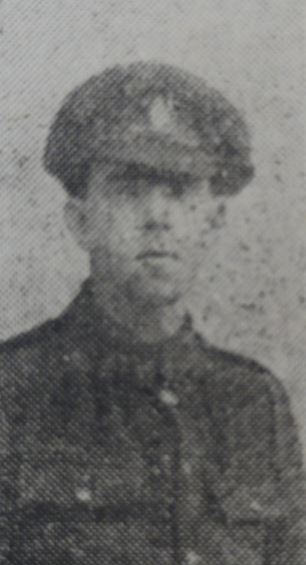Gnr
George Croft
Information about birth
|
Year of birth: 1893 |
|
Place of birth: Blackpool, Lancashire, England, United Kingdom |
General information
|
Last known residence: 38 Cecil Street, Blackpool, England, United Kingdom |
|
Profession: Butcher |
Army information
|
Country: England, United Kingdom |
|
Force: British Expeditionary Force |
|
Rank: Gunner |
|
Service number: 104915 |
|
Enlistment place: Manchester, Lancashire, England, United Kingdom |
|
Units: — Royal Field Artillery, "C" Bty. 74th Bde. (Last known unit) |
Information about death
|
Date of death: 04/10/1917 |
|
Place of death: Wood 15, Boezinge, Belgium |
|
Cause of death: Killed in action (K.I.A.) |
|
Age: 24 |
Cemetery
|
Canada Farm Cemetery Plot: III Row: A Grave: 23 |
Distinctions and medals 3
|
1914-15 Star Medal — 06/01/1920 |
|
British War Medal Medal — 07/04/1920 |
|
Victory Medal Medal — 07/04/1920 |
Points of interest 5
| #1 | Place of birth | ||
| #2 | Last known residence | ||
| #3 | Enlistment place | ||
| #4 | Place of work | ||
| #5 | Place of death (approximate) |
My story
George Croft was born in 1893. He was the youngest child of Ann and Thomas Croft from Blackpool, Lancashire. George worked as a butcher with his elder brother Thomas in Lord Street, Blackpool. He enlisted in Manchester, Lancashire in 1915. At the time of the Battle of Passchendaele, George served as a gunner in the Royal Field Artillery ‘C’ Battery, of the 74th Brigade Royal Field Artillery, part of the Divisional Artillery of the Guards Division.
On 18 and 19 August 1917, the 74th Brigade RFA moved to new positions at Lapin Farm, near Abri Wood. The ‘C’ and ‘D’ Batteries took up their new positions at General Farm. From these positions, the Brigade supported the Guards Division, who were in the front line opposite Houthulst Forest. Throughout August 1917, George's Brigade and the wider area were shelled on several occasions. The unit suffered a total of sixty-four casualties. Twelve men were killed and fifty-two wounded. During September, the 74th Brigade had an equally hard time. Eight men were killed and twenty-seven wounded, and six 18-pounder guns and five 4.5-inch howitzers were put out of action.
After a brief rest at the French village of Herzeele, all batteries resumed their old positions. ‘C’ and ‘D’ Battery at Wood 15, while ‘D’ Battery took up positions at Battery Copse. A few days later, on 4 October 1917, ‘C’ Battery's position was heavily shelled. Two officers and 10 other ranks were killed or wounded. Among the dead was gunner George Croft, 24. He was buried in Canada Farm Cemetery. According to a statement by his sergeant, in an article in the Blackpool Times, George was killed by concussion from a large shell that fell behind him while he was operating his gun.
On 18 and 19 August 1917, the 74th Brigade RFA moved to new positions at Lapin Farm, near Abri Wood. The ‘C’ and ‘D’ Batteries took up their new positions at General Farm. From these positions, the Brigade supported the Guards Division, who were in the front line opposite Houthulst Forest. Throughout August 1917, George's Brigade and the wider area were shelled on several occasions. The unit suffered a total of sixty-four casualties. Twelve men were killed and fifty-two wounded. During September, the 74th Brigade had an equally hard time. Eight men were killed and twenty-seven wounded, and six 18-pounder guns and five 4.5-inch howitzers were put out of action.
After a brief rest at the French village of Herzeele, all batteries resumed their old positions. ‘C’ and ‘D’ Battery at Wood 15, while ‘D’ Battery took up positions at Battery Copse. A few days later, on 4 October 1917, ‘C’ Battery's position was heavily shelled. Two officers and 10 other ranks were killed or wounded. Among the dead was gunner George Croft, 24. He was buried in Canada Farm Cemetery. According to a statement by his sergeant, in an article in the Blackpool Times, George was killed by concussion from a large shell that fell behind him while he was operating his gun.
Sources 4
|
"Gunner George Croft. Killed in Action at his Gun", (Blackpool, Blackpool Times, 04/10/1917). Sources used |
|
"Gunner George Croft. Killed in Action at his Gun", (Blackpool, Blackpool Times, 17/11/1917). Sources used |
|
74 Brigade Royal Field Artillery (The National Archives, Kew (TNA), WO 95/1203/4). https://www.nationalarchives.gov.uk/ Sources used |
|
Census Returns of England and Wales, 1911 (The National Archives, Kew (TNA), RG14). https://www.nationalarchives.gov.uk/ Sources used |
More information 3
|
Commonwealth War Graves Commission Database https://www.cwgc.org/find-records/find-war-dead/casualty-details/435584 |
|
Namenlijst (In Flanders Fields Museum) https://namenlijst.org/publicsearch/#/person/_id=1cb6da36-f622-4f30-972c-8c2710f5cb10 |
|
Lives of the First World War (Imperial War Museum) https://livesofthefirstworldwar.iwm.org.uk/lifestory/1022576 |
